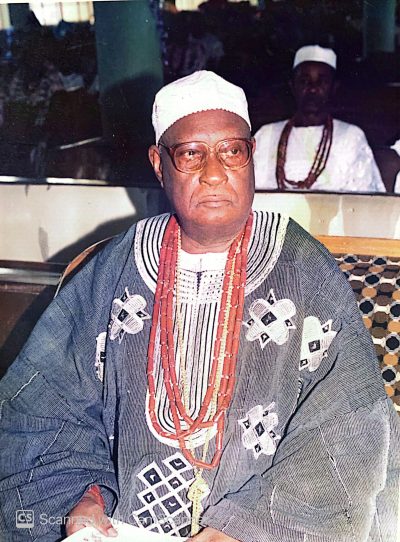The Enduring Legacy of Oba Adigun Oshin Omiyomade I

HRM Alaiyeluwa Oba Adigun Oshin, Omiyomade 1, Elemure of Emure kingdom Ekiti, Nigeria, reigned from 1983 to 2006
Born to Serve: Prince Adigun Bamidele Oshin: The Journey of a Monarch Who Transformed Emure Ekiti
Prince Adigun Bamidele Oshin’s ascent to the throne of Emure Ekiti was a testament to resilience. He was a dedicated leader with an unwavering commitment to his community. Born into the Abenimota Ruling House, his path to kingship was neither smooth nor anticipated.
Early Life and Education
Adigun’s early years were marked by adversity. His father, Prince Elkanah A. Oshin Oluseri, a prosperous cocoa merchant in Ondo, had to abandon his business to care for his declining health. This decision plunged the family into financial hardship. Out of six siblings, only Adigun continued his education, attending St. Luke’s Primary School in Ikere as a pupil teacher. Earning a modest salary, he supplemented his income by working on local farms.
Determined to further his education, Adigun sat for entrance exams and was accepted into St. John’s Teachers’ College, Owo, in 1953. He borrowed funds from friends and family to pay for his tuition. Upon completion, he taught at various schools, including Modern School, Usi, and Teacher’s Grade III College, Usi. During this period, he passed the General Certificate of Education (GCE) in seven subjects, advancing to Teacher’s Grade I.
Professional Journey
In 1959, Adigun transitioned into the Western Region’s civil service as an accounts clerk. His career trajectory saw him seconded to the Action Group party headquarters as a paymaster. In 1961, he and his wife, Rhoda Modupe Obaweya, moved to London for further studies. He trained as a chartered accountant at Balham and Tooting College of Commerce. Completing his studies in a record four years, he gained practical experience at the Middlesex County Council. Adigun later secured a position as an internal auditor at the London Borough of Barnet.
Return to Nigeria and Ascension to the Throne
His Royal Highness P. A. Adebayo Ajimuda Aminmin II passed away in 1963. Prince Oshin’s family, the Abenimota Ruling House, invited him to return home and contest for the throne. He declined, replying that he would not abandon his education. Following Nigeria’s military coup in 1965, Prince Adigun, who had completed his studies, returned to Nigeria with his son. His wife remained in the United Kingdom to complete her studies. Prince Oshin initially worked with the Federal Inland Revenue Department before moving to Dunlop Tyre Industries in Ikeja.
Upon the passing of Oba Taiwo Ogunleye Amugbayeo in 1974, the Abenimota Ruling House invited Adigun once again to contest for the throne. He declined. He was, however, persuaded to lead the family’s cause in the fight to reclaim the contested right of the family to the throne. The Morgan Commission eventually upheld the Abenimotas’ right to the Elemure stool.
Thinking his job was done, Prince Adigun prepared to support whoever was put forth from his lineage to become monarch. He bought a brand new Toyota Crown as a gift for the would-be Oba. However, destiny was not ready to release him. His people and the town’s educated elite jointly urged other candidates to step down, mounting pressure on him to take on the role. On February 18, 1983, he was installed as the Eleru of Emure Ekiti after a nine-year interregnum, and named Omiyomade I, Atobiloye II. His formal coronation took place on March 6, 1983. The ensuing legal battles culminated in the 2000 Supreme Court ruling, which upheld his appointment and coronation.
Legacy and Contributions
As monarch, Oba Adigun Bamidele Oshin was committed to the development of Emure Ekiti. He encouraged the diaspora to invest in the community. He led by example, establishing a produce purchasing company, gari and lafun production, and animal feed manufacturing under Oshin & Oshin Ltd. His initiatives contributed to the local economy. He provided employment opportunities.
In education, he improved standards by recruiting qualified teachers and sponsoring underprivileged students. His political acumen was evident in his collaborative efforts with others to advocate for the creation of Ekiti State. He went on to advance the economic viability and administrative independence of his people. He succeeded soon afterwards in facilitating both the creation of the State and the Emure Local Government administration in December 1996.
Religiously, Oba Oshin was a devout Christian. He dismantled traditional idol worship practices within the kingdom and promoted Christian values. He also facilitated the establishment of Imole Estate, a residential area that attracted Christian evangelists and religious groups. The estate replaced the previously dreaded Igbo Imole.
Under his leadership, the new modern palace was built, and the Ebenezer Palace was completed in 2007, shortly after his passing.
Final Years and Passing
Oba Oshin’s reign was marked by dedication to his people and unwavering service. In late 2006, while attending a court session in Ado Ekiti, he suffered a heart attack. He passed away on 27 December 2006, on his 47th wedding anniversary. It was six weeks before his 24th coronation anniversary.
His Royal Majesty’s journey from humble pupil to tutor and then to a revered monarch is a testament to perseverance. He also had a deep commitment to community development and the protection of the weak. His legacy continues to inspire the people of Emure Ekiti and beyond. HRM Oba Adigun Bamidele Oshin Omiyomade 1 was survived by Eyelua Rhoda Modupe Oshin and five children. His children, Adeyinka, Babatunde, Ibironke, Omobolanle, Babafemi, and their offspring are grateful for his legacy. After the demise of Omiyomade 1, Oba Emmanuel Adebayo Aminmin III ascended the throne of Emure Ekiti.
Authored by Eyelua Rhoda M. Oshin, and edited by Tomifola Babalola
